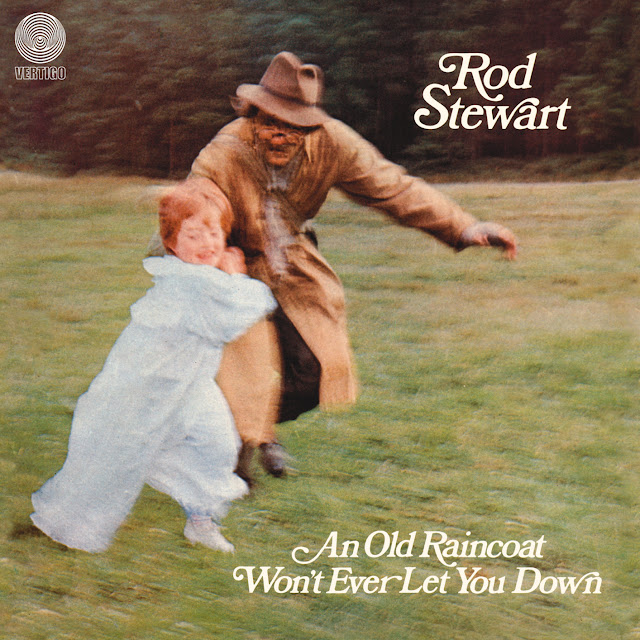Rod Stewart: An Old Raincoat Won't Ever Let You Down - 1969
"Rod Stewart is highly original interpreter of other people's songs, and his own compositions indicate that he is capable of startlingly bare emotion and compassion" - Rolling Stone
The
thing is, though, old Rod could still come out with a killer song - I
Was Only Joking and You're In My Heart were two such examples. Despite
my immersion in punk at the time, Rod was still an unashamedly guilty
pleasure. The
eighties saw him decline into synth pop, as did Elton John, The Rolling
Stones and even Bob Dylan so I guess he could be forgiven (just) but I
have to say I paid little attention to him during his period.
The opener, a cover of The Rolling Stones' 1968 classic, Street Fighting Man, is turned into an acoustic-driven but raucous slice of madcap folk-blues, compete with rumbling bass solo at the end. I love it, despite its ramshackle, uncohesive and shambolic feel. There is just something so down-home bluesy about it. It sets the tone for the sound of much of Stewart's early material.

Firstly, a brief intro to Roderick David Stewart....
As for many of my contemporaries, it was actually Maggie May that first captivated me as a twelve year-old, watching
soon to be legendary cocksman kick footballs around on Top Of The Pops.
I liked his flamboyant, laddish cheekiness and it was just such a great
song, wasn't it? I duly bought the single and then the equally good (if
not better) You Wear It Well, followed by What Made Milwaukee
Famous and Oh No Not My Baby as they duly came out. I became a Faces fan
too, unsurprisingly. Rod was a lad. The Faces were lads. I was a lad.
The deal was sealed.
As
the decade continued, I faced the dilemma that faced many Rod Stewart
fans as he turned up on Top Of The Pops in make-up to sing The First Cut
Is The Deepest just as punk was beginning to take off and, by 1978 was
coming out with the awful cod-disco of Da Ya Think I'm Sexy? What to do?
A hugely credible artist was becoming a preening self-parody in front
of our eyes.
As
the years have passed, I have come back to him with his later albums
and caught him live on a few occasions and a good time was had by all,
as Stewart himself may have said. He is another of these artists, like
Dylan, Elton, The Stones, Springsteen, Van Morrison, Elvis Costello that
I have never given up on, over so many years.
Now for his debut album.....
By now something of a veteran blueser to the cognoscenti, Rod Stewart's debut solo album was a thing of ragged, raw-edged beauty. Taking rock songs and turning them into soulful folk songs, dominated by an aggressive acoustic guitar and punchy drum attack he came up with something quite unique. Something that seemed to complement his throaty, rasping vocal perfectly. Stewart cut his teeth in the mid-late sixties singing the blues and he applies the blues power to his vocals on here.
A Man Of Constant Sorrow is a traditional folk song sung over a slide guitar, acoustic guitar and bass backing. It is very raw and stark and a little bit of an acquired taste and nothing like later work in Stewart's career.
Some searing electric guitar swirls all around Stewart's self-penned Blind Prayer, a song written as if it were an authentic 1930s road blues. It is packed full of tough upbringing references, seemingly written from the perspective of a blind Delta bluesman. Musically it was raw, bassy and bluesy. Perfect chunky blues rock, 1969 style. As I said, everything is all very rough round the edges, but that sort of adds to the rough and ready appeal of the album. However, the sound had been considerably polished by the following year's album, Gasoline Alley.
Well, everyone is surely familiar with the beautiful Mike D'Abo song Handbags And Gladrags by now. It actually comes as a surprisingly relaxing break from the frenetic blues-folk that had given such a breakneck opening to the album. The piano coda is lovely and Stewart's vocal just sublime. Possibly his finest moment. Yes, it's that good. A big rumbling bass on it too. Chris Farlowe covered it well too, as did The Stereophonics in later years, but it is one of those songs that Rod made his own.
An Old Raincoat Won't Ever Let You Down is a thumping, raw rocker with another big bass sound and Stewart's great vocal matching the pounding drum sound.
I Wouldn't Change A Thing has an almost jazzy rhythm in its cymbal work, and also some "prog-rock"-style madcap organ. It really didn't sound like anything else at the time, although it has a Blood Sweat & Tears vocal part in it half way through. It is a bit indulgent in that late sixties way, but it has an appeal too, despite that. The same sonorous organ introduces Cindy's Lament. Once again the drums are massive and you get the feeling that Rod's vocals are completely ad hoc. It has a Hendrix-y feel to it.
A star was born, of that there was no doubt. This young guy certainly had something. The same applied to his guitar-playing mate on this record, lovable river-gypsy Ronnie Wood. Both had been around the scene for several years but here they really started to make people take notice.
The final track is a warm, rhythmic cover of the Ewan McColl folk classic, Dirty Old Town, complete with some impressive blues harmonica.
An interesting album worthy of anyone's spare half hour.







Comments
Post a Comment